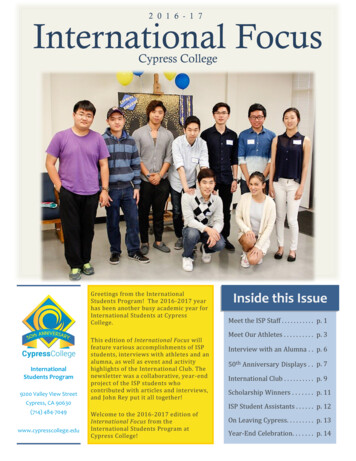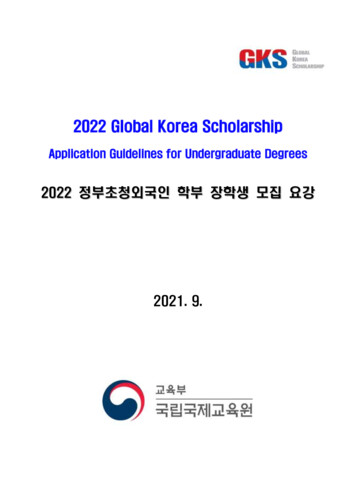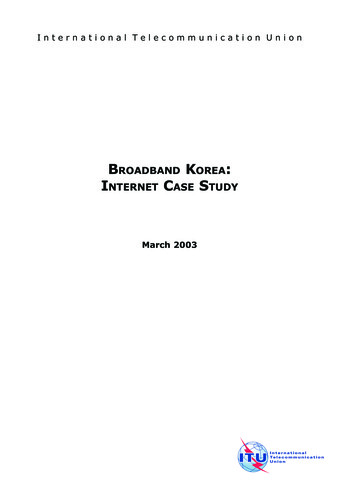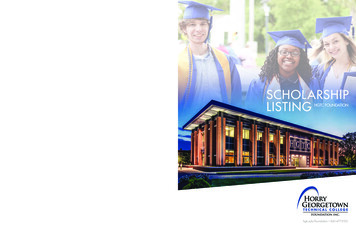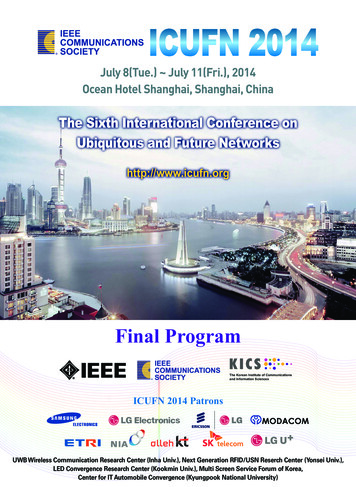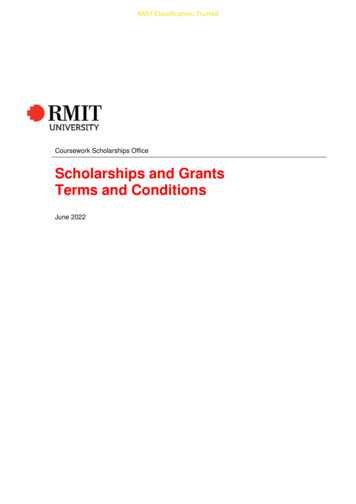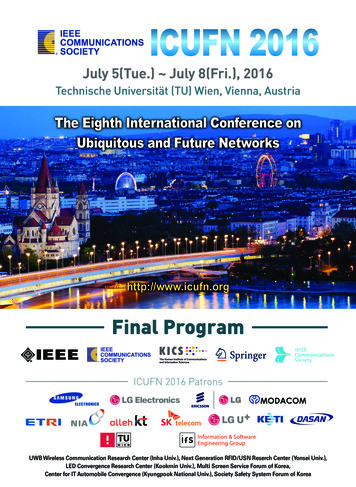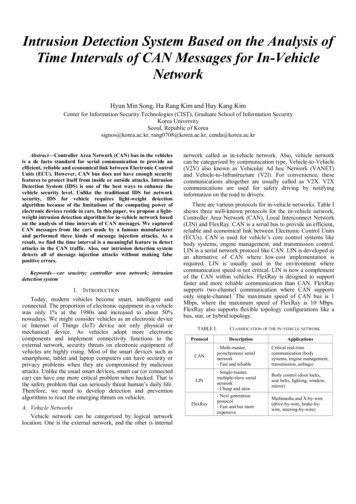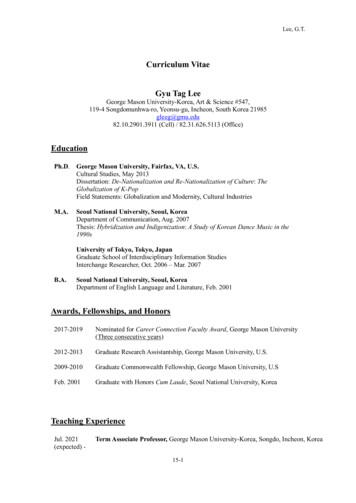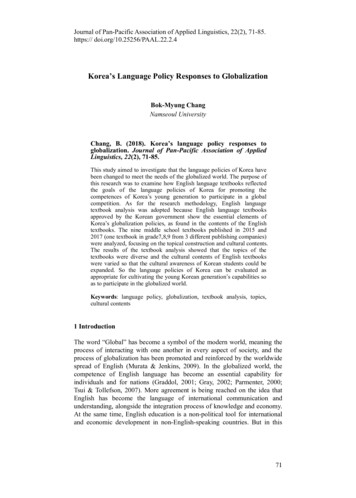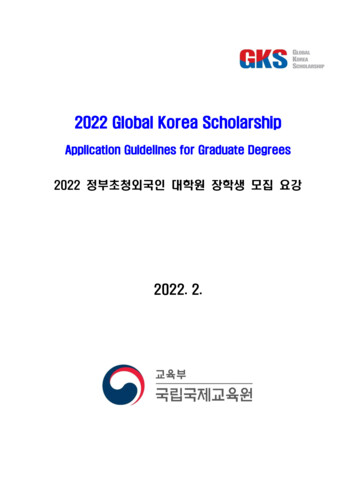
Transcription
2022 Global Korea ScholarshipApplication Guidelines for Graduate Degrees2022 정부초청외국인 대학원 장학생 모집 요강2022. 2.
Table of Contents1. PROGRAM OBJECTIVES . 22. PROGRAMS AND UNIVERSITY. 23. QUOTA ASSIGNED BY COUNTRY . 54. ELIGIBILITY .105. APPLICATION AND SELECTION .146. SCHOLARSHIP INFORMATION .257. CONTACT INFORMATION .27Appendix A. GPA Conversion Table .28Appendix B. Contacts of Korean Embassies .29Appendix C. Contacts of Universities .351
2022 Global Korea Scholarship (GKS)Application Guidelines for Graduate Degrees1. PROGRAM OBJECTIVES Global Korea Scholarship is designed to provide international students with opportunities to study athigher educational institutions in Korea in pursuit of academic degrees, which will enhance internationaleducation exchange and deepen mutual friendship between Korea and participating countries.※ As Korean Government Scholarship Programs have been integrated and branded as Global KoreaScholarship in 2010, the name has been changed to GKS (Global Korea Scholarship)2. PROGRAMS AND UNIVERSITY Degree ProgramsCategoryMaster's DegreeDoctoral DegreeResearch ProgramPeriod1 year of Korean language program 2 years of degree program1 year of Korean language program 3 years of degree program6 months or 1 year Application TracksEmbassy TrackUniversity TrackDegree ProgramDegree al4252001005730Total1,378 Available Fields of Study and Universities Available Fields of Study-Applicants can only apply to the universities and departments that are listed in the „UniversityInformation‟ file attached under the GKS Notice post in Study in Korea website.(www.studyinkorea.go.kr Scholarships GKS Notice)-Academic programs offered during evenings (night school), short-term programs, online anddistant-learning programs are not applicable in this scholarship program.2
List of available UniversitiesClassificationType A(24 institutions)Embassy TrackAvailable UniversitiesAcademy of Korean Studies, Ajou University, Chung-Ang University, Dongguk University (Seoul),Duksung Women's University, Ewha Womans University, Hankuk University of Foreign Studies, HanyangUniversity (Seoul), Hongik University (Seoul), KAIST (Korea Advanced Institute of Science andTechnology), KDI School of Public Policy and Management, Konkuk University, Kookmin University,Korea Polytechnic University, Korea University, Kyung Hee University, POSTECH (Pohang University ofScience and Technology), Seoul National University, SeoulTech (Seoul National University of Scienceand Technology), Sogang University, Sookmyung Women's University, Sungkyunkwan University, UNIST(Ulsan National Institute of Science and Techology), Yonsei UniversityBusan University of Foreign Studies, Chonnam National University, Chungbuk National University,Chungnam National University, Daegu University, Daejeon University, Dong-A University, DongseoUniversity, Gangneung-Wonju National University, Gyeongsang National University, Hannam University,Inje University, Jeju National University, Jeonbuk National University, Kangwon National University,Type BKeimyung University, Kongju National University, Konyang University, KOREATECH (Korea University(32 institutions) of Technology and Education), Kumoh National Institute of Technology, Kyungpook National University,Mokwon University, National Korea Maritime & Ocean University, Pai Chai University, Pukyong NationalUniversity, Pusan National University, Semyung University, Silla University, Soonchunhyang University,Sun Moon University, Sunchon National University, Yeungnam University※ Embassy track applicants must choose three different desired universities and available departmentsamong 59 universities listed above, and must include at least one university from Type B.※ Research Program applicants can apply to all universities among Type A and B.(Continued in the next page)3
ClassificationUniversity TrackAvailable UniversitiesAcademy of Korean Studies, Ajou University, Chung-Ang University, Dongguk University (Seoul),Duksung Women's University, Ewha Womans University, Hankuk University of Foreign Studies, HanyangUniversity (Seoul), Hongik University (Seoul), KAIST (Korea Advanced Institute of Science andTechnology), KDI School of Public Policy and Management, Konkuk University, Kookmin University,Korea Polytechnic University, Korea University, Kyung Hee University, POSTECH (Pohang University ofScience and Technology), Seoul National University, SeoulTech (Seoul National University of Scienceand Technology), Sogang University, Sookmyung Women's University, Sungkyunkwan University, UNIST(Ulsan National Institute of Science and Techology), Yonsei UniversityGeneral(56 institutions)Busan University of Foreign Studies, Chonnam National University, Chungbuk National University,Chungnam National University, Daegu University, Daejeon University, Dong-A University, DongseoUniversity, Gangneung-Wonju National University, Gyeongsang National University, Hannam University,Inje University, Jeju National University, Jeonbuk National University, Kangwon National University,Keimyung University, Kongju National University, Konyang University, KOREATECH (Korea Universityof Technology and Education), Kumoh National Institute of Technology, Kyungpook National University,Mokwon University, National Korea Maritime & Ocean University, Pai Chai University, Pukyong NationalUniversity, Pusan National University, Semyung University, Silla University, Soonchunhyang University,Sun Moon University, Sunchon National University, Yeungnam UniversityBusan University of Foreign Studies, Chonnam National University, Chungbuk National University,Chungnam National University, Daegu University, Daejeon University, Dong-A University, DongseoUniversity, Gangneung-Wonju National University, Gyeongsang National University, Hannam University,Inje University, Jeju National University, Jeonbuk National University, Kangwon National University,RegionalKeimyung University, Kongju National University, Konyang University, KOREATECH (Korea University(32 institutions) of Technology and Education), Kumoh National Institute of Technology, Kyungpook National University,Mokwon University, National Korea Maritime & Ocean University, Pai Chai University, Pukyong NationalUniversity, Pusan National University, Semyung University, Silla University, Soonchunhyang University,Sun Moon University, Sunchon National University, Yeungnam UniversityR&D(12 institutions)ResearchAjou University, Chonnam National University, Gyeongsang National University, Inje University, KAIST(Korea Advanced Institute of Science and Technology), Keimyung University, Kookmin University,KOREATECH (Korea University of Technology and Education), Kyungpook National University,SeoulTech (Seoul National University of Science and Technology), Soonchunhyang University,Sungkyunkwan UniversityResearch Program applicants can apply to any universities listed above※ R&D Program is newly added to the University Track: This program will provide R&D-focusedcurriculum and field experience in research institutes and industries. In addition, the program is to attractand nurture talented scholars in the strategic high-tech industry and to be beneficial to individual‟s futurecareer.4
3. QUOTA ASSIGNED BY COUNTRY Quota for Embassy Track General: 603 scholars from 136 regionsNo.Country & RegionQuota No.Country & RegionQuota No.Country & RegionQuota1Afghanistan335Dominican Republic369Kenya52Albania136DR ola138Egypt472Latvia15Argentina339El Salvador373Lebanon26Armenia340Equatorial alaysia1810Bahamas, Gambia, anmar1417Bolivia251Greece285Nepal318 Bosnia and 3Guyana287New nduras189Nigeria622Bulgaria856Hong Kong290Norway123Burkina tan525Canada359Indonesia2793Palestine226Canada hilippines1430Costa Rica364Italy698Poland231Cote 00Romania233Czech n11102Rwanda35
No.Country & Region Quota No.Country & Region Quota No.Country & Region Quota102Rwanda3114Sweden1126Turkmenistan6103Saudi alia2121Timor-Leste3133Uzbekistan12110South Africa2122Togo1134Vietnam28111Spain2123Trinidad and Tobago2135Zambia2112Sri tal603 Overseas Korean: 20 scholars from 12 countriesNo.Country & RegionQuota No.Country & RegionQuota No.Country & ssia112Uzbekistan3Total20※ Overseas Koreans refer to ethnic Korean without Korean citizenship. Overseas Koreans includeKorean adoptees and offspring of Korean diaspora or Korean immigrants who live in countries out of theKorean peninsula. Korean Language Teaching Professional: 15 scholars from 9 countriesNo.Country & RegionQuota No.Country & RegionQuota No.Country & nam3Total15 Research Program: 10 scholars from 136 regionsNo.Country & RegionQuota No.Country & RegionQuota No.1Armenia13India12Ethiopia14Pakistan15Country & RegionQuotaTurkey1Total5※ Among 10 candidates allocated for the Research Program, 5 candidates will be selected from the 5countries listed above. The remaining 5 candidates will be selected from any 136 participating countrieslisted in this section.6
Quota for University Track Research Program: 5 scholars (This program is open to all countries around the world) General: 425 scholars from 73 countries/ Regional University: 200 scholars from 42 countriesQuotaNo.Country rbaijan4QuotaNo.Country e10145Myanmar1882616Colombia31446Nepal53817Costa an63919Egypt32549Peru31420El ungary20256Sierra 54258Slovakia10129Iran22459Spain20230Italy22460Sri Lanka325No.Country &No.Country &QuotaQuota7
a10167Turkmenistan314425200625Total R&D Program: 100 scholars※ Applicants from all countries can apply to the R&D programNo.University1Ajou UniversityDepartmentComputer EngineeringQuota7Artificial Intelligence Convergence2Chonnam NationalUniversityData ScienceElectrical Engineering10Materials Science and EngineeringMechanical EngineeringMechanical Convergence EngineeringAI Convergence EngineeringMechanical and Aerospace Engineering (Mechanical Engineering,Mechanical Design)Mechanical and Aerospace Engineering (Aerospace Engineering)3Gyeongsang NationalUniversityBiosystems Engineering10Industrial and Systems EngineeringEnergy and Mechanical EngineeringElectronic EngineeringChemistryMaterials Engineering and Convergence Technology4Inje UniversityNanoscience & EngineeringDigital Anti-Aging Health Care88
ace Engineering5Future Vehicle ProgramKAIST (Korea AdvancedSchool of ComputingInstitute of Science andCivil and Environmental EngineeringTechnology)Bio and Brain Engineering7Industrial & Systems EngineeringChemical and Biomolecular EngineeringGraduate School of Culture Technology6Keimyung UniversityPharmacy77Kookmin UniversityElectronics Engineering108KOREATECH (Korea Department of Mechanical EngineeringUniversity of Technology Department of Computer Science and Engineeringand Education)Department of Energy, Materials and Chemical Engineering332MathematicsWood & Paper Science910Kyungpook NationalUniversityFood Science & Biotechnology(Major in Food Biotechnology)Food Science & Biotechnology(Major in Food ApplicationTechnology)Convergence & Fusion System EngineeringData ScienceSeoulTech (SeoulMaterials Science and EngineeringNational University ofScience and Technology) Applied Artificial IntelligenceSemiconductor Engineering88ICT ConvergenceSoftware Convergence11SoonchunhyangUniversityMobility Convergence Security10Future Convergence TechnologyIntegrated Biomedical science(SIMS)Life ScienceBiomedical Science12SungkyunkwanUniversityIntelligent Precision Healthcare Convergence7BiophysicsEnergy ScienceBiomedical EngineeringTotal1009
4. ELIGIBILITY Eligibility Nationality-All applicants must hold citizenship of NIIED designated countries that are invited to take partin the GKS program.-All applicants and their parents must NOT hold Korean citizenship. If an applicant orhis/her parent(s) hold dual citizenship (one who have Korean citizenship and citizenship ofanother country), he/she is NOT eligible to apply.-For Overseas Korean applicants (Embassy Track) holding Japanese citizenship, if their parentshold „Permanent Residency Permit‟ within Japan while holding Korean citizenship, they areexceptionally eligible to apply.※ Applicants and their parent(s) may hold different citizenship. Applicant‟s parent(s) may holda citizenship of non GKS participating countries.※ Applicants and their parents who had previously held Korean citizenship must submitdocumentation that proves their renunciation of Korean citizenship. Degree Requirements-Master’s Program Applicant: Must hold a bachelor‟s degree or a level of educationequivalent to or higher than a bachelor‟s degree.-Doctoral Program Applicant: Must hold a master‟s degree or a level of education equivalentto or higher than a master‟s degree.-Research Program Applicant: Must have received an invitation from one of the partneruniversities and must meet the criteria below; Postdoctoral Research Program: Must hold a Doctoral degree (by February 28,2022)Professor Exchange Program: Must hold a Master‟s degree AND must be currentlyteaching at a university as a professorProgram for Education·Science·Culture·International Cooperation Professionals:Must hold a Master‟s degree AND must be a professional in a field of Education,Science, Culture, or International Cooperation (E.S.C.I.)※ Applicants who are expected to graduate by August 31st, 2022 can also apply for the programwith a certificate of expected graduation. (not applicable for applicants currently in adoctoral program) Such applicants must submit their official graduation certificate (ordiploma) and final academic transcript to GKS Center, NIIED by August 31st, 202210
Grades-All applicants must have maintained a Cumulative Grade Point Average (CGPA) equivalent toor higher than any ONE of the following from their previous degree program*.* i.e.) If an applicant who already has a doctoral degree applies for another doctoral degreeprogram in GKS, his/her previous degree program will be a master‟s degree program CGPA must be above 2.64/4.0, 2.80/4.3, 2.91/4.5 or 3.23/5.0Score percentile should be 80% or above on a 100-point scale or be ranked within the top20% within one‟s class-If an applicant holds a transcript that does not include information on CGPA or is unable toconvert his or her grades into any one of the acknowledged GPA scales (4.0, 4.3, 4.5, 5.0, or100 point scale), then the applicant must submit additional documents officially issued by theirrespective university describing the university‟s grading system.-Applicants who are expected to graduate should calculate the most recent CGPA at the time ofapplication.-Must be under 40 years of age (born after September 1, 1982)-Academic professors in one of the Official Development Assistance (ODA) recipients* who areunder 45 years of age (born after September 1, 1977) are eligible to apply.* DAC List of ODA Recipients on 2022 and 2023 flows (www.oecd.org) AgeODA Recipients (107)Afghanistan, Albania, Algeria, Angola, Argentina, Armenia, Azerbaijan, Bangladesh, Belarus, Belize, Benin, Bhutan,Bolivia, Bosniaand Herzegovina, Botswana, Brazil, BurkinaFaso, Burundi, Cambodia, Cameroon, China, Colombia,Comoros, CostaRica, Coted’Ivoire, Cuba, Dominican Republic, DR Congo, Ecuador, Egypt, ElSalvador, EquatorialGuinea, Eritrea, Ethiopia, Fiji, Gabon, Gambia, Georgia, Ghana, Guatemala, Guinea, Guyana, Haiti, Honduras, India,Indonesia, Iran, Iraq, Jamaica, Jordan, Kazakhstan, Kenya, Kyrgyzstan, Laos, Lebanon, Lesotho, Liberia, Libya,Madagascar, Malawi, Malaysia, Mauritania, Mauritius, Mexico, Moldova, Mongolia, Montenegro, Morocco,Mozambique, Myanmar, Nambia, Nepal, Nicaragua, Nigeria, Pakistan, Panama, Paraguay, Peru, Philippines, Republicof the Congo, Rwanda, Saint Vincentand the Grenadines, Senegal, Serbia, SierraLeone, Somalia, South Africa,SriLanka, Sudan, Syria, Tajikistan, Tanzania, Thailand, Timor-Leste, Togo, Tunisia, Turkey, Turkmenistan, Tuvalu,Uganda, Ukraine, Uzbekistan, Venezuela, Vietnam, Yemen, Zambia, Zimbabwe Health-All applicants must be in good health, both mentally and physically, to study in Korea for thefull duration of the program.-If an applicant is found to be in one of the following conditions, the applicant will bedisqualified in the final round of selection:11
An applicant is tested positive on drug testsAn applicant who has a serious illness that prevents him or her to study abroad for longperiod of time including the full duration of Korean language training or degreeprogram in Korea※ All applicants must submit „Form 8. Personal Medical Assessment‟ at the time of application.All applicants who pass the 2nd round of selection must receive comprehensive medicalcheckup and submit an Official Medical Examination issued by a medical doctor or alicensed hospital. After arriving in Korea, all GKS scholars will be subject to a medicalexamination administered by NIIED. If a GKS scholar is found to have a serious illness fromthe medical examination after arriving in Korea, he or she will be disqualified from theirGKS scholarship Others-All applicants must have no grounds for disqualification (e.g., criminal history) for overseastravel.-Previous or current GKS scholars who meet the additional criteria below are eligible to apply. Must hold the grade of 90% or above on a 100-point scale or be ranked within the top10% within one‟s classMust hold TOPIK level 5 or 6 (must hold a valid certificate at the time of application)Previous or current GKS scholars can participate in the GKS program once more onlyin a higher degree program** Bachelor‟s Master‟s / Master‟s Doctoral or Research / Doctoral Research-Applicants for Korean Language Teaching Professional must meet the additional criteria below. Eligibility for Korean Language Teaching Professional Inservice* or Preservice** Korean language teaching professional* Inservice teaching professional: must have at least 1 year of teaching career (as ofFebruary 28, 2022) in an elementary school, a secondary school or a university as ateacher, a lecturer, or a professor** Preservice teaching professional: Those who have completed “Korean languageteaching professionals training course (해외 현지 한국어교원 양성과정)” atuniversities/institutions in respective countries that are administered by Ministry ofEducation, Republic of Korea can also apply※ Current teaching professionals with a teaching career less than a year can apply forKorean Language Teaching Professional program if they have completed “Koreanlanguage teaching professionals training course (해외 현지 한국어교원 양성과정)” Must hold a valid TOPIK level 4 or aboveMust apply to a department relevant to „Korean Language Education‟ field12
Restriction-Applicants who have graduated from Korean high school (including international schools) oruniversity are NOT eligible to apply. (exception: Overseas Korean adoptees or previous GKSscholars)※ (Exception) Applicants who have previously studied in Korean universities as exchange orvisiting students CAN apply-Former applicants who had withdrawn from the scholarship after being selected as GKSscholars (applicable to those who did not enter Korea or did not enroll at their Korean languageinstitution/University, and who had renounced their scholarship) and whose scholarship wasforfeited during their scholarship period are NOT eligible to apply.※ (Exception) Former GKS scholar whose scholarship was forfeited due to a scholar‟s failure toachieve TOPIK level 3 or above after completing Korean language program may be deemedeligible to re-apply if a scholar submits a valid TOPIK certificate with level 5 or above-Applicants who have previously received a degree program scholarship from one of theKorean government scholarship programs are NOT eligible to apply.※ Applicants who received scholarships from GKS Non-degree program for foreign exchangestudents CAN apply-Applicants must choose and apply for only ONE track. Embassy track applicant must choose only ONE of the following programs: General orOverseas Koreans adoptee, Korean Language Teaching Professional, or ResearchProgramUniversity track applicant must choose only ONE of the following programs: General,Regional University, R&D Program, or Research Program. University trackapplicants can only apply to ONE university and ONE department※ If an applicant applied to more than one track/university, his or her application will bedisregarded at the 2nd round of selection.-Embassy track applicant whose application have not passed the first round of selection* mayapply to a university track as long as they can meet the application deadline of the re-applyinguniversity.* Successful candidates of the first round of selection (whose names were forwarded to NIIEDfrom each embassy including backup candidates) cannot apply for a university track again13
Applicants must check additional restriction or eligibility set by each university-Please check if there are any additional eligibility set by each university/department※ Embassy track applicants who succeed in the first and second round of selection may also failin the third round of selection if they do not meet the additional eligibility set by eachuniversity/department※ Please be mindful of any additional restriction set by each university/department. If you donot meet this standard and fail to enroll in the university, your scholarship may be cancelled,and you must return to your country on your own expense even though you have completedthe Korean language program-Please check if there are any additional restriction (e.g., enrollment period) set by eachuniversity/department※ Scholars whose Korean language program is delayed (e.g., return after a leave of absence)must check if their degree program is only available to start at a certain period of time. Forexample, if a program starts in September only, scholars cannot resume their degree programin March.5. APPLICATION AND SELECTION Selection Procedures Selection ProceduresEmbassyTrack:2nd Round ofSelection (EmbassyTrackCandidates)1st RoundRecommendationof Selection for candidates(Embassy) 1 RoundstRecommendationUniversity of Selection for candidates(University)Track:Step 1. Embassy/UniversityNIIED3rd Round ofSelection(EmbassyTrackCandidates) Announce of2022 GKS-GScholars Announce of2022 GKS-GScholars 2nd Round ofSelection(University TrackCandidates)Step 2. NIIED Step 3. UniversityNIIED14
Selection ScheduleCategoryEmbassyTrackUniversityTrack1st round ofselectionSuccessfulcandidates of the 1stround NIIED2nd round ofselection3rd round ofselectionFebruary March early Aprillate April late MayFebruary April late Aprillate May-Announcementof finalsuccessfulcandidateslate June※ Embassy track applicant whose application have not passed the first round of selection may apply to auniversity track Selection TimelineAnnouncement of ApplicationGuidelines(NIIED)Study in Korea (www.studyinkorea.go.kr)Announcement of1st Round Selection Schedule(Embassies, Universities)Announced by each embassy/university- Each embassy/university will release their 1st round selection schedule on their website.Application Submission(Embassies, Universities)Deadline will be set by each Korean embassy and university1st Round of Selection(Embassies, Universities)Announcement date will be set by each Korean embassy and universitySuccessful Candidatesof the 1st Round(Embassies, Universities NIIED)2nd Round of Selection(NIIED)Submission ofOfficial Medical Examination(2nd Round Successful Candidates NIIED)3nd Round of Selection(Universities)Notify Applicant's Choice ofUniversity(Successful Candidates NIIED)Announcement of2022 GKS-G Scholars(NIIED)Successful candidates' applications and related documents will arrive at NIIED- Embassy Track: by early April / University Track: by late AprilSuccessful candidates of the 2nd round will be announced- Embassy Track: by early May / University Track: by late MaySubmission Deadline: by June 15th (Wed.)- All candidates who pass the 2nd round must submit their medical examination result issuedby a medical doctor or a licensed hospitalEmbassy Track applicants who pass the 2nd round selection will be reviewd by threeuniversities which they initially applied toAnnouncement Deadline: by June 10th (Fri)- Universities will inform the successful candidates to NIIED- Universities will inform the result to successful applicants individuallyEmbassy Track applicants who pass the 3rd round selection should notify their final choiceof university to NIIED via emailNotification Deadline: by June 15th (Wed)Expected announcement date: late JuneNIIED will inform final results to Embassies and Universities- The final successful candidates will be announced on Study in Korea website15
Documents to Submit Application Submission-Application period: Each embassy and university has their own application deadline, soapplicants must check with the respective institute before submitting application.-Method of submission: Each embassy and university who conducts the first round of selectionmay have their own document submission guidelines, so applicants must check with therespective institute before submitting application. List of documents to submitTypeDocumentsto red plication DocumentsMaster'sDoctoralResearch1(form 1) Application FormRequiredRequiredRequired2(form 2) Personal StatementRequiredRequiredRequired3(form 3) Study PlanRequiredRequired4(form 4) Research Proposal (only applicable for research program applicants)5(form 5) ONE letter of RecommendationRequiredRequired6(form 6) Letter of Invitation (issued by the research program university)7(form 7) GKS Applicant AgreementRequiredRequiredRequired8(form 8) Personal Medical AssessmentRequiredRequiredRequired9Bachelor's graduation certicate (or diploma)RequiredRequiredRequired9'Bachelor's degree Required10 Master's graduation certicate (or diploma)RequiredRequired10' Master's degree transcriptDoctoral graduation certicate (or diploma)11- only applicable for Postdoctoral Research program applicantsDoctoral degree transcript11'- only applicable for Postdoctoral Research program applicantsCertificate of Employment12- only applicable for E.S.C.I. Professionals13 Applicant's/Parent(s)' Proof of Citizenship and family relationship DocumentRequiredRequiredRequired
KOREATECH (Korea University of Technology and Education), Kyungpook National University, SeoulTech (Seoul National University of Science and Technology), Soonchunhyang University, Sungkyunkwan University Research Research Program applicants can apply to any universities listed above General (56 institutions)
